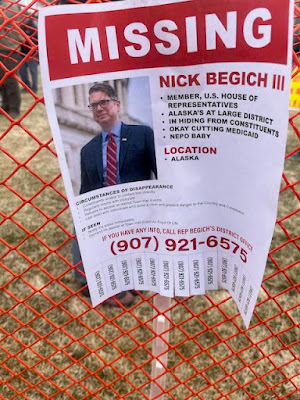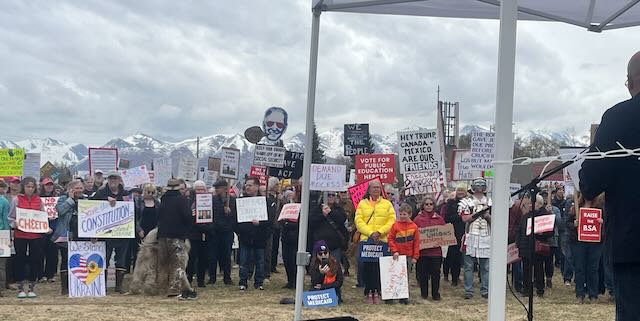The calendar has caught up with me. I was ready for you all up through Sunday and would love to highlight today's offerings, but I also want to say something about two good films I saw yesterday.
You're No Indian
I'd seen In the Wake of Justice Delayed and Remaining Native on Saturday. Both are good films which tell important stories about being Native in the United States. They do an excellent job of conveying the emotional impacts of the abuses Native peoples have suffered and the lasting impacts. Their films mention court cases (in Justice) and historic abuses of boarding schools (in Remaining.) Their both solid, important films.
I was wary about You're No Indian because it was about disenrollment. I co-authored an academic article on Native American Law and I know that topic gets complicated quickly and that there is so
 |
| Ryan Flynn and Santana Rabang left |
much that most people have no idea about. How can someone make that into an interesting movie?
They managed to do it. You're No Indian powerfully highlights both the emotional and cultural impact of disenrollment and also collects a pile of evidence to show that the disenrollment process in many tribes - particularly those with lots of casino money - is aimed at reducing the number of people with whom they have to divide casino profits and at getting rid of opponents to their power in the tribes. [Blogger doesn't recognize the term disenrollment and underlines it in red each time I type it.]
They offer shocking evidence of tribal leaders denying the validity of members' documented birth records, and in one case, where the tribal leader's ancestry includes the same ancestors as the people he disenrolled.
They include those records. They include a historian of Indian records hired by the tribe to do research. When the expert they hired gives them conclusions they don't want to hear, they reject it. There's also a Native attorney who is banned from coming into the hearing to represent his client.
The part that will leave most viewers who are not well-versed on Native American law still scratching their heads, is the lack of a way to appeal the disenrollment decisions. Essentially, Native Americans have fought over the years to have sovereignty over their own affairs on Indian country. There are rules about who has jurisdiction over different kinds of cases based on where the infraction occurred (Native land or not), who was involved (Native or non-Native), and the type of crime. Natives have accomplished a certain amount of autonomy on Native land, which prevents the state from meddling in Native affairs, but this documentary shows how that victory has left holes that allow tribes to commit serious offenses against fellow tribal members.
The film and the discussion afterward mentioned that the film makers have received cease and desist orders to stop them from showing the film. Film festivals have also received such threats (including the Anchorage International Film Festival). Some festivals are wary of being sued and have not shown the film. Fortunately AIFF showed the film. My thought is that when you get such threats, it means you're hitting a nerve. If they had legitimate legal claims, the opponents of the film would file those claims in court.
This was the movie I said, yesterday morning, that I hadn't seen yet - the movie that works for me on all levels. And as I say this, I also acknowledge my own bias for a strong rational argument, which this film presents. They've simply made a very strong documentary on an important topic. While some might say this is a pretty esoteric and small group, the film does a good job of pointing out the significance.
They say 11,000 people have been disenrolled in tribes around the country. They further point out that the living and future offspring of those 11,000 people have also been effectively disenrolled.
Compounding this is the destruction of Native culture in the affected tribes. Money, not cultural traditions, win out. And the number of Native Americans dwindles. They also point out that disenrollment was used by the US government to eliminate Native Americans as part of their campaign to assimilate (as in the Boarding schools), remove (from their land to reservations), or eliminate (kill) Native Americans. In this case, it's Natives doing this work.
A powerful and well documented movie that keeps the audience's attention throughout. The museum was packed and there were lots of questions and comments at the end.
A Little Fellow: The Legacy of A.P. Giannini.
The other movie I want to point out is A Little Fellow: The Legacy of A.P. Giannini. I don't have time now, but I will get back to this film which tells the story of the founder of the Bank of Italy in San Francisco, a bank focused on the small businesses and everyday people, who were excluded by most other banks. There are many amazing stories about Giannini in this film, and about the bank that eventually became, under Giannini's leadership, The Bank of America. (Though, since 1998, when Bank of America was bought out, no longer practices those principles Giannini set up for his bank.)
It's a generally unknown story, told well in this film. More later I hope.
I'm headed out to the Alaska Experience Theater for Uncensored Shorts at 10:30, then The Collaborator at 1pm and then for Female Filmmaker Showcase at 5:30 at the Bear Tooth and then Rosemead at 8:30.
J took our guests to the 9am meetup and pitch session. There's also a film maker pizza party later and their meeting the Austrian Honorary Consul General - Katrine is Austrian - and the Consul has been supportive of the film.




 There was a long line at the WIC table. This market is in the lowest income area of Anchorage and the
There was a long line at the WIC table. This market is in the lowest income area of Anchorage and the 

























